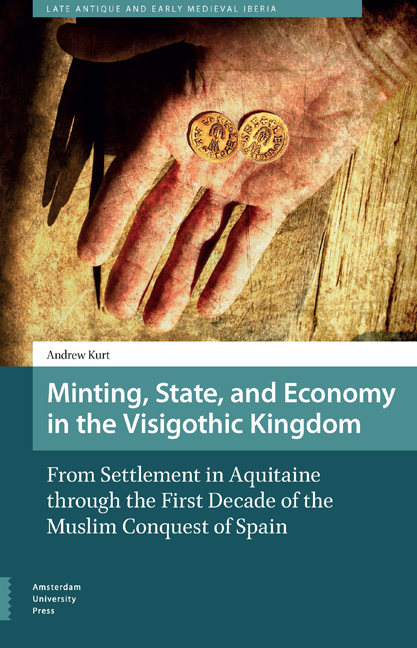 Minting, State, and Economy in the Visigothic Kingdom
Minting, State, and Economy in the Visigothic Kingdom Book contents
- Frontmatter
- Contents
- List of figures
- Acknowledgments
- Introduction
- 1 Pre-Regal Visigothic Coinage
- 2 The King’s Coinage: The Beginning and Development of theRegal Coinage (c. 573-c. 720) 81 A The Transition to a Regal
- 3 The Activities of the Mints from c. 573- c. 720
- 4 Why Were Gold Coins Struck in the Visigothic Kingdom?
- 5 The Royal Control of Visigothic Minting
- 6 Coinage in Spain in the Aftermath of the Islamic Conquest
- 7 Visigothic Currency in the Early Medieval Economy
- Conclusion
- Appendix I
- Appendix II
- Bibliography
- About the Author
- Index
6 - Coinage in Spain in the Aftermath of the Islamic Conquest
Published online by Cambridge University Press: 21 November 2020
- Frontmatter
- Contents
- List of figures
- Acknowledgments
- Introduction
- 1 Pre-Regal Visigothic Coinage
- 2 The King’s Coinage: The Beginning and Development of theRegal Coinage (c. 573-c. 720) 81 A The Transition to a Regal
- 3 The Activities of the Mints from c. 573- c. 720
- 4 Why Were Gold Coins Struck in the Visigothic Kingdom?
- 5 The Royal Control of Visigothic Minting
- 6 Coinage in Spain in the Aftermath of the Islamic Conquest
- 7 Visigothic Currency in the Early Medieval Economy
- Conclusion
- Appendix I
- Appendix II
- Bibliography
- About the Author
- Index
Summary
Abstract
Chapter Six considers the end of the Visigothic kingdom, which came in 711 with the Muslim invasion from northwest Africa, and how the new Islamic state and its minting compared with that of the previous regime. In ten years, Islamic coinage in Iberia moved from wholly Latin inscriptions to bilingual to wholly Arabic legends. It is believed that multiple minting sites were rapidly consolidated into one single gold mint at the new capital, Cordoba. The strictly gold minting of the late Visigothic era gave way to minting in gold dinars (solidi) and copious issues of bronze coins. Temporarily, Islamic coins in Iberia had reduced gold purity levels, but these were soon raised to the high Islamic and Byzantine standards.
Keywords: Islamic; Muslim; invasion; transitional; dinar; Roderic
Visigothic rule and its structures would be brought to a dramatic end after more than two hundred years in Iberia. That story has relevance for the theme of this book since altered circumstances offer perspective by way of contrast but also of transition. As the series of victorious Islamic campaigns sprang from the Arab lands, we may begin our brief look at this stage in the direction of the Near East.
In a small palatial complex from the early or mid-eighth century at Qasr ‘Amra in eastern Jordan, an intriguing fresco depicts six kings. Nearby is inscribed the word ‘Nike’, victory. Included among the rulers of lands where Islam successfully marched in this display of domination is the short-lived Visigothic king of distant Spain, Roderic. He had been defeated in the summer of 711 by the forces of the Berber commander of the Maghrib, Ṭāriq ibn Ziyad. The story is slightly complicated by the contestation of the monarchy at just this time, and the numismatic evidence stands in the center of the events at the end of one regime and the beginning of a quite different one, most especially because literary evidence is not available until several decades, or in the case of Arab texts over two centuries, later The rather sudden takeover puts us in position to see two administrations and two cultures in comparison.
- Type
- Chapter
- Information
- Minting, State, and Economy in the Visigothic KingdomFrom Settlement in Aquitaine through the First Decade of the Muslim Conquest of Spain, pp. 247 - 256Publisher: Amsterdam University PressPrint publication year: 2020


